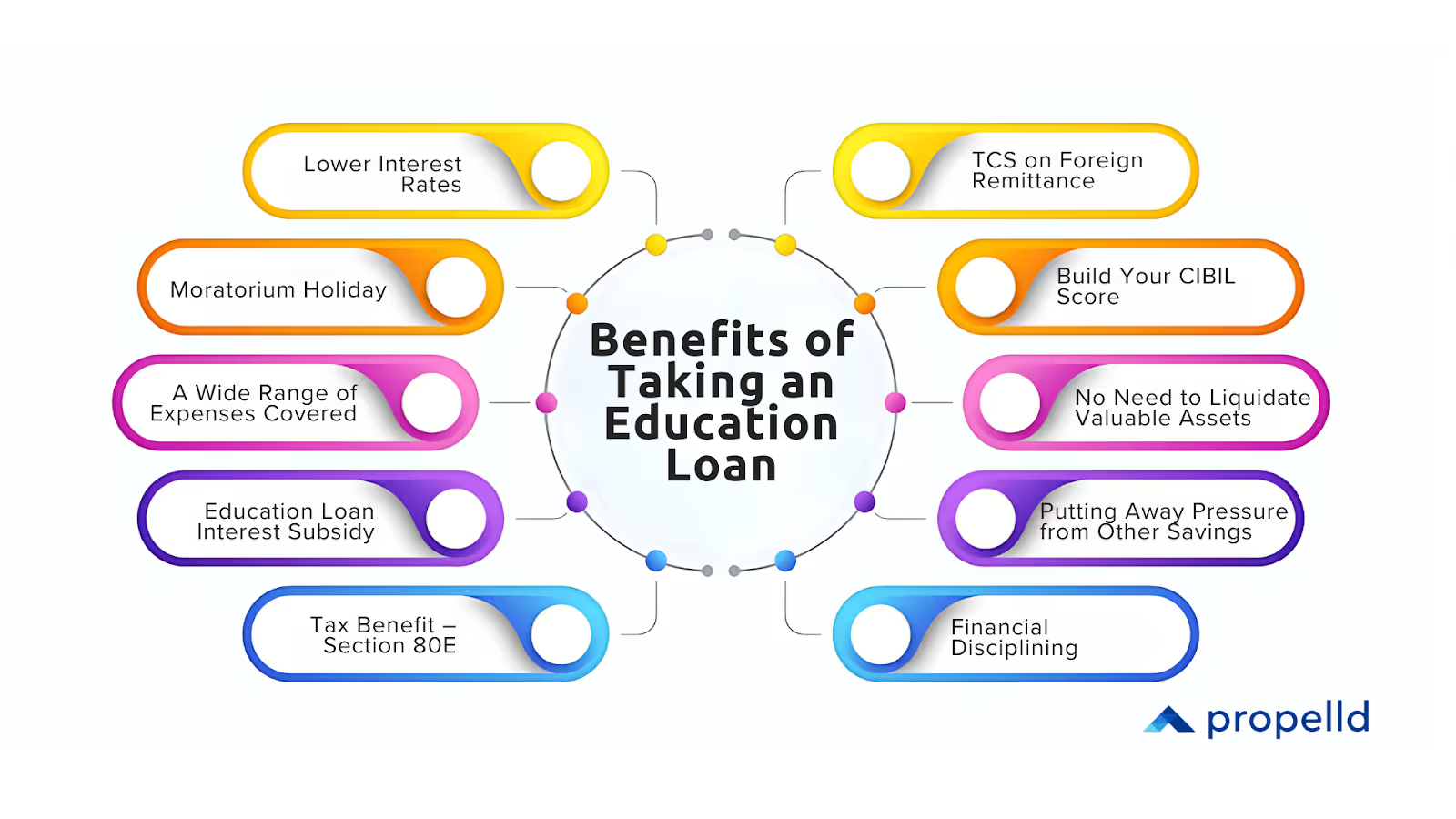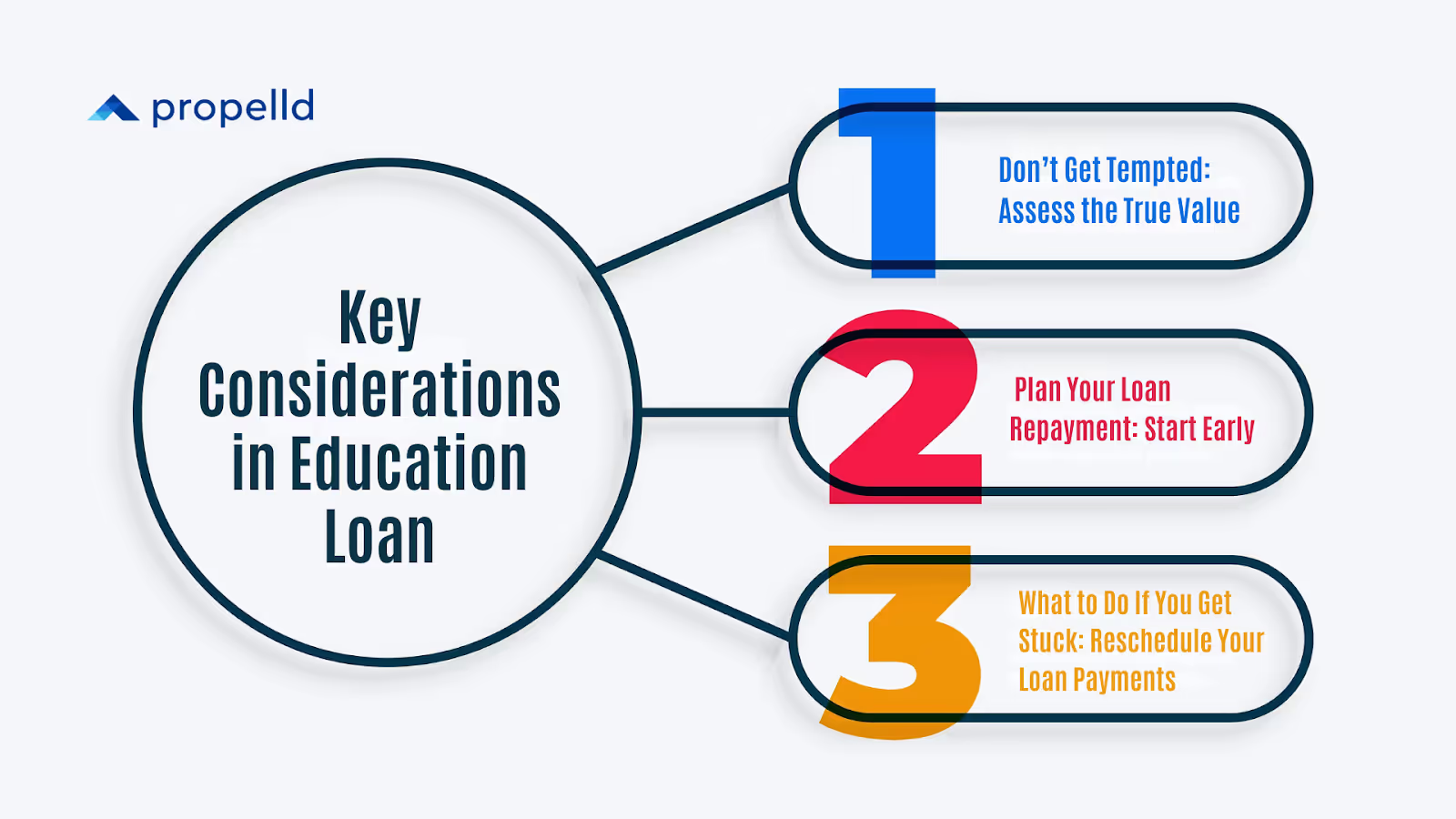Is Education Loan Worth It? Key Advantages and Considerations
Education has become one of the most significant investments you can make for your future. However, with rising tuition fees and living costs, the question often arises: Is education loan worth it?
According to recent data from the Ministry of Education, the cost of higher education in India has surged by over 15% in the last five years. While education loans can help ease the financial burden, they come with crucial considerations, including interest rates, repayment terms, and long-term financial commitments.
This article explores whether an education loan is worth it, breaking down its advantages and critical considerations.
11 Reasons Why Taking an Education Loan is a Good Idea

Taking an education loan can be a game-changer for many students, allowing access to quality education without the immediate financial strain.
Here are several vital reasons why opting for an education loan can be an intelligent choice.
1. Lower Interest Rates
Education loans typically come with lower interest rates compared to personal loans or credit cards. These rates are designed to make higher education more accessible to students.
Banks and financial institutions, as well as government-backed schemes, offer these loans at favourable rates, ensuring that repayment is manageable after completing the course.
2. Moratorium Holiday – Pay After Course Completion
Most education loans come with a moratorium period, also known as a repayment holiday. This feature allows students to defer repayment until after their course is completed, with some loans even offering an additional grace period before repayments begin.
3. A Wide Range of Expenses Covered
Education loans don't just cover tuition fees. They extend to cover various other expenses such as accommodation, books, travel (for students studying abroad), laptops, and other necessary tools for learning.
4. Education Loan Interest Subsidy
Many governments provide interest subsidies on education loans for students from economically weaker sections of society. Under schemes like the Central Sector Interest Subsidy Scheme (CSIS), the government covers the interest during the moratorium period, significantly reducing the overall financial burden on students.
5. Tax Benefit – Section 80E
Interest paid on education loans is eligible for tax deductions under Section 80E of the Income Tax Act. This benefit can be claimed for up to eight years from the time you start repayment, offering a significant reduction in your taxable income, thereby reducing the total cost of the loan.
Get Education Loan for Any College in India. 100% Fees Financed- Propelld Education Loan
6. Tax Collection at Source (TCS) on Foreign Remittance
For students planning to study abroad, education loans also cover expenses related to TCS on foreign remittances. The mandatory 5% TCS on sending funds abroad can be a significant cost, but education loans help in financing this, ensuring smooth financial management for international education.
7. Build Your CIBIL Score
Repaying an education loan on time can significantly improve your CIBIL score, which reflects your creditworthiness. A good credit score is essential for securing future loans for things like a house or car.
Timely repayments not only make future borrowing easier but also help you secure lower interest rates on other loans.
Also Read: How to increase CIBIL score - 10 Easy Tips
8. No Need to Liquidate Valuable Assets
An education loan allows you to fund your studies without having to liquidate valuable family assets like property, gold, or investments. This helps preserve these assets for future financial goals, and you can pursue higher education without depleting family resources.
9. Putting Away Pressure from Other Savings
With an education loan, you don’t have to dip into your or your family's savings. This means that your emergency funds or savings for other long-term goals remain untouched, providing peace of mind and financial security for your family during your studies.
10. Financial Disciplining
Taking and managing an education loan teaches financial discipline at an early stage. It helps students understand the importance of budgeting, timely payments, and the impact of interest rates on long-term financial planning.
11. Crucial If You Are Planning to Go Abroad
For students aiming to study abroad, the cost can be significantly higher due to international tuition fees, living expenses, and travel. An education loan is crucial in covering these costs, ensuring that you can achieve your goal of studying at prestigious universities without immediate financial strain.
This is especially important when considering currency fluctuations and high living costs abroad.
Also Read: Best Country to Study Abroad for Indian Students in 2025
Get upto 100% Education Fees Financed with Propelld. Simplified Processing Dedicated Support.
Who Should Opt for an Education Loan and Why?
Education loans are often the go-to financial option for students from middle-income families, but they have become increasingly relevant for others as well due to various compelling factors.
Here’s why an education loan might be the right choice for different groups of people.
Rising Education Costs
With the cost of higher education escalating rapidly, particularly in professional fields like engineering, medicine, and international studies, funding education through personal savings is becoming less viable for many families.
An education loan provides a practical way to cover these escalating costs without putting immediate strain on family finances.
Students Taking on Financial Responsibility
Many students today wish to take their financial future into their own hands and relieve their parents from the burden of education costs. By opting for an education loan, you take responsibility for your own education expenses, allowing your parents to preserve their savings for other purposes like retirement or emergency funds.
Building a Positive Credit History
Another advantage of taking an education loan is the opportunity to build a solid credit history. Repaying the loan on time helps students establish their creditworthiness. A good credit score can offer lower interest rates and better loan terms.
Students with limited upfront funds but strong repayment potential can benefit from loans—especially when Tax Benefits on Education Loan Repayment offer savings that make borrowing more affordable.
Minimal Documentation. Higher Chances of Approval. Easy Online Processes. Check Your Eligibility.
Is Education Loan Worth It? Important Factors to Evaluate
Deciding whether an education loan is worth the financial commitment is a crucial decision that requires careful thought and planning. With the increasing costs of higher education and the long-term impact of student debt, it's essential to evaluate several critical factors before taking on a loan.
1. Earn a Marketable Degree, So Borrowing Pays Off
One of the primary reasons to take out an education loan is to earn a degree that enhances your earning potential. Degrees in fields with high demand can significantly increase your income, making the investment worthwhile.
By choosing a field with solid job prospects, you enhance your chances of securing a position that justifies the cost of the loan.
2. Do the Research on Careers That Pay
By choosing a career with a higher earning potential, you can better ensure that you’ll be able to manage your loan repayments effectively and achieve a favourable return on your investment.
3. Borrow Judiciously for Graduate and Professional Degrees
When considering education loans for graduate or professional degrees, borrowing judiciously is critical. Graduate and professional programs often come with higher costs, and it’s essential to evaluate the potential return on this investment carefully.
To make an informed decision about taking out an education loan, consider the following questions.
4. Will my degree be marketable?
Research the demand for your chosen field and assess whether it will provide a good return on your investment.
5. What can I expect to earn?
Look into potential salary ranges for graduates in your field to get an idea of whether you can comfortably manage loan repayments.
6. How long will it take to repay my loans?
Understand the loan terms and repayment schedule to estimate how long it will take to pay off your debt.
7. How long will it take to achieve a return on my investment?
Evaluate how long it will take for your increased earning potential to offset the cost of your education.
Get your Loan Disbursed 10 times Faster than Banks. Apply Now.
Is Education Loan Worth It for Abroad Studies? Key Considerations
When considering an education loan for studying abroad, it's essential to weigh the pros and cons carefully. The decision to take on such financial responsibility shouldn’t be taken lightly, as it has long-term implications not only for you but potentially for your family.
Below are vital factors to consider before opting for an education loan for overseas studies.

If you're considering studying abroad, the Education Loan for Ireland guide helps you assess loan benefits, costs, and repayment feasibility before committing to an overseas program.
1. Don’t Get Tempted: Assess the True Value
Before you get carried away by the allure of studying abroad, take a step back and critically evaluate whether the investment is worth it. Higher education in foreign countries often comes with a hefty price tag, and it's essential to ensure that your future earnings can justify the expense.
Be sure to have a realistic conversation with your family about the financial burden this might create.
2. Plan Your Loan Repayment: Start Early
Creating a clear repayment plan is one of the most crucial steps in managing an education loan. After securing employment, notify your lender and begin your EMI payments as early as possible. This way, you’ll avoid last-minute financial stress and keep your loan under control.
Consistently saving a portion of your earnings once you start working will help you stay on top of repayments and minimise interest accumulation.
3. What to Do If You Get Stuck: Reschedule Your Loan Payments
In some cases, financial difficulties might make it hard for you to keep up with your loan repayments. Indian banks generally require collateral for loans above INR 7 lakhs, giving them the right to liquidate your assets in the event of a default.
Lenders may offer various options, such as rescheduling your repayment plan. However, keep in mind that rescheduling might lead to an extended loan tenure, which can increase the total interest you’ll pay over time.
Also Read: How to Get an Education Loan for Abroad Studies in 2024?
To wrap up, when evaluating the question “is education loan worth it?”, it requires a thoughtful consideration of both its advantages and potential drawbacks. Key benefits like lower interest rates, moratorium periods, and tax deductions underscore the potential value of these loans. You also need to assess your ability to repay, your career prospects, and the overall financial impact. By carefully weighing these factors, you can make an informed decision that aligns with your educational aspirations and financial future.
Don’t let finances stand in the way of your dreams. Propelld provides fast digital approvals, flexible repayment options, and loans up to 50 lakhs with no collateral.
Why Propelld?
The following are the primary benefits of Propelld.
Apply now with Propelld and turn your academic ambitions into reality!











.svg)